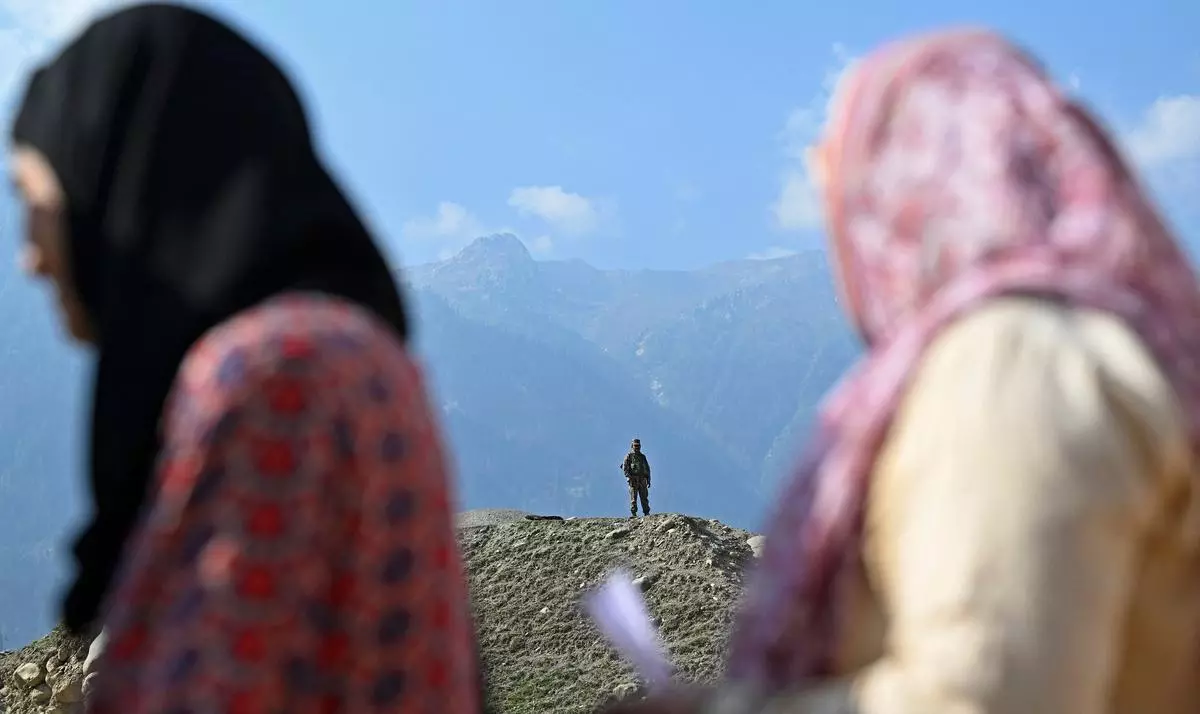
A first-time voter shows his inked finger after voting in Udhampur during the final phase of Jammu and Kashmir Assembly elections, October 1, 2024.
| Photo Credit: ANI
The elation in Srinagar is unmissable. It follows you everywhere—on the streets, in the shops and while you travel from one end of the city to the other.
The victory of the National Conference in the just-concluded elections to the first-ever Assembly of the Union Territory of Jammu & Kashmir has come as a massive boost to a population mourning the loss of a state and special status in 2019.
“It was the only thing we could do,” Javed, who was driving me and other passengers in his Tata Sumo towards Lal Chowk in the heart of Srinagar, said about the election results.
It’s quite a change from the Kashmir of November 2019 – when the same people felt they had been cheated by the same pro-India parties like the National Conference and the People’s Democratic Party that had failed to protect Kashmir’s special status.
Today, all that is forgotten. The tactical voting in the Valley (Jammu being an altogether different story) led to a sweeping victory for the NC, and its junior partner Congress and displays in ample measure the fact that the people have changed.
The change is so dramatic that an entirely new category of a first-time voter has been created in the Kashmir Valley. Those who never thought that they would vote came out in large numbers to throng polling booths.
The first-time voter spans those in their 30s and in their 60s too. “I had never voted before but this time I felt I had to,” a teacher who preferred anonymity told me.
Sons reported mothers expressing their desire to vote, and nephews spoke about uncles wanting to make the journey to the polling booth which was previously a no-no for them.
Why did this change come about? The people I spoke to were clear that the election was the one chance they had to keep the BJP away from power. And their dissatisfaction with the PDP allying with the BJP after the 2014 State Assembly elections meant the NC was the only choice.
All the efforts of the BJP to increase the seats in Jammu, release Engineer Rashid, and get nominees of the still-banned Jamaat-e-Islami to contest came to naught as the people figured this was an effort to divide the vote and help the ruling party at the Centre.

A security officer stands guard as voters line up to cast their ballots at a polling station during the second phase of Kashmir Assembly elections in Ganderbal on September 25, 2024.
| Photo Credit:
TAUSEEF MUSTAFA
As Jammu & Kashmir waits for an NC-led government to be formed in the Union Territory, expectations of the people are sky-high even though they know the new administration will be hobbled in many ways.
First and foremost, the government will have no police powers, which will be vested in Lieutenant Governor Manoj Sinha. Neither will the incoming Chief Minister have the power to appoint law officers nor will he have control over the anti-corruption bureau.
The government can still do plenty though. Water, power, transport and forests remain under the purview of the elected government. And there is a lot to do in all these areas.
A shopkeeper in the busy Residency Road told me: “Right now, I have no water in my shop. There is no one I could have complained to.”
But now things have changed. “I can at least contact my local MLA now. Till now, there was no access,” the shopkeeper continued.
Communication from the ground up is now possible. It will no longer be a government from above. Redress is again in the realm of the possible.
It’s not going to be easy for the elected Chief Minister or his Ministers given that there has been a democratic vacuum for the past five years.
But the government has no option. It will have to walk the tightrope between the people and the Lieutenant Governor / Delhi.
At least two autorickshaw drivers this writer spoke to were full of praise for Prime Minister Narendra Modi though neither of them had voted.
One of them, Merajuddin, claimed that there was no leader quite like Modi. He was special. But there was only one problem — Merajuddin said he could not support “anti-Muslim acts” committed by Modi like abrogating Article 370.
The other, who chose not to give his name, said tall parties and politicians were the same. They did nothing for the people; that’s why he had chosen not to vote.
That’s a pretty mainstream view–one that can be heard without much probing in other parts of India.
Amit Baruah is a Senior journalist and author of “Dateline Islamabad.” He has reported from Delhi, Colombo, Islamabad, and Southeast Asia.





